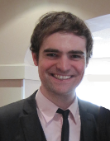Joseph Collin
Investigating the feasibility of single cell transcriptomics to determine the composition and maturity of hPSC-derived retinal organoids
Joseph Collin, Rachel Queen, Carla B. Mellough and Majlinda Lako
Irreversible loss of retinal cells, such as photoreceptors, causes a significant proportion of blinding conditions. Currently no therapies exist to restore vision. The ability to generate retinal organoids from human embryonic stem cells (hESCs) represents an opportunity to gain greater insight into the biology and potential of lab-grown human retina in order to understand and alleviate blindness. Using the combination of a GFP reporter hESC line for the key retinal transcription factor CRX, fluorescence-activated cell sorting, the Fluidigm C1 single cell capture platform, automated imaging, RNA-Seq and bioinformatics, the feasibility of single cell RNA-Seq of retinal organoids during their differentiation in vitro was investigated.
Unsupervised clustering analysis revealed genes which were significantly differentially expressed between clusters. Subsequent ontology enrichment analysis showed that the predominant cluster had a similar transcriptional profile to that of adult murine photoreceptors. Supervised analysis using previously identified genes of interest showed expression of early markers of photoreceptor development. This indicated the potential of organoid culture to generate an identifiable and largely homogenous population of photoreceptor precursor-like cells.
Utilising this single cell RNA-Seq approach allowed insight into the transcriptional identity of individual cells as they arise in vitro and could therefore provide detailed analysis of lab-generated retina for the modelling of development and disease, drug discovery and cell replacement therapies.
Biography

Dr. Joseph Collin is a Senior Postdoctoral Researcher in the Stem Cell Laboratory led by Prof. Lako at Newcastle University. Whilst studying for his BSc in Genetics & Biochemistry at Aberystwyth University he followed his stomach and secured placements researching cocoa in Ghana and strawberries in Kent. Joe also managed a short studentship in his home town University of Birmingham identifying novel cell binding peptides to direct non-viral vectors to human endothelial cells. This led to a project characterising leukaemia-associated antigens as diagnostic markers and targets for immunotherapy at Kings College London. He then travelled north to undertake his PhD where he studied new roles for proteins directing mitosis and chromosome segregation. Joe then took this knowledge to the somewhat warmer climes of Valencia where he embarked on an investigation involving microRNA control of the cell cycle in human pluripotent stem cells. It was during this project that he became fascinated by the ability of pluripotent stem cells to self-renew and generate virtually all cell types. A return to Newcastle allowed him to begin his current research utilising the self-organising properties of pluripotent stem cells to generate eye tissue in vitro. He is now involved in the optimisation and interrogation of this system using organoid technology, gene editing, RNA-Seq and imaging and hopes that this will lead to lab-generated retina for drug screening, disease modelling and future cell replacement therapies for blindness.












